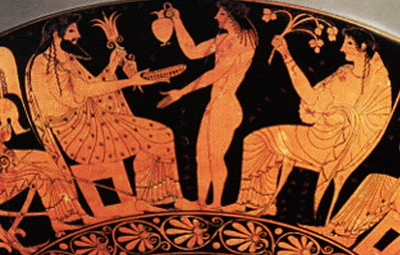In Greek literature the gods are known as the ἄμβροτοι (ambrotoi), the plural of ἄμβροτος (ambrotos), meaning immortal. Despite its different appearance, this word exactly corresponds to Sanskrit अमृतः (amṛtaḥ), which has retained a more original form, from the point of view of comparative linguistics and the processes they have revealed about the behaviour of the elements involved in the construction of the word here in question. These elements are: the past participle मृतः (mṛtaḥ), dead, made from the root मृ (mṛ), to die, and the privative prefix अ (a), which gives अमृतः the meaning immortal.
Now, to understand how this turns up as ἄμβροτος (ambrotos) in Greek, one has to understand that the suffix of the past participle, -τος (tos) in Greek and -तः (taḥ) in Sanskrit, was always accented and that, when suffixed to a root, this root would be unaccented and therefore take on its shortest possible form. What does “shortest possible form” exactly mean? Any root of Greek or Sanskrit can appear in a long form, which contains, additionally to the characteristic elements of the root, a supporting vowel. What are the characteristic elements and what the support vowel? E.g. the root in question here, forms the present मरति (marati), in which the root takes on the long form मर् (mar), consisting of the characteristic consonantal elements म् (m) and र् (r), telling us which root we are dealing with, between which is the supporting vocalic element अ (a). But when the root goes into its shortest form this supporting vowel disappears. This means that the consonant र् (r) will need to take on the function of a vowel, since any syllable needs a vowel to be a syllable worthy of its name. Sanskrit happens to have such a version of this consonant, called a vocalic r, written ऋ (ṛ), so there is no problem in following the logics of the rules behind the shape-shifting of word forms as far as Sanskrit is concerned. But Greek lost this sound. Places in which this form of the r appeared therefore needed remodelling. And this is exactly what happened: whenever there is a ऋ (ṛ) in Sanskrit, Greek represents this as ρο (ro) or ορ (or), i.e. instead of making the r vocalic it adds a proper vowel to the r, which is allowed to remain a consonant. Additionally, Greek also sometimes adds a consonantal glide when remodelling such sounds, which is something happening inside Greek and has no etymological or even really logical reason behind it. This peculiarity of Greek helps to explain why the Greek form is not ἄμροτος (amrotos), but ἄμβροτος (ambrotos). The same thing also happens with the Greek word for man ἀνηρ (anēr), which in Sanskrit is ना (nā), with the base form नृ (nṛ), note the vocalic r. The Greek genitive ἀνδρός (andros) has the same type of glide inserted, while Sanskrit has the less tampered genitive नरः (naraḥ). Knowing this, the two words ἄμβροτος (ambrotos) and अमृतः (amṛtaḥ) are as similar to each other as the English word house is similar to the German Haus. The word ambrosia, ἀμβροσίη (ambrosiē) in Greek, the drink the gods drink when tired of observing the toils of the βρὀτοι (brotoi), i.e. the mortals, has the same origin as the word designating the gods themselves.
Silvio Zinsstag,
teacher for ancient languages

